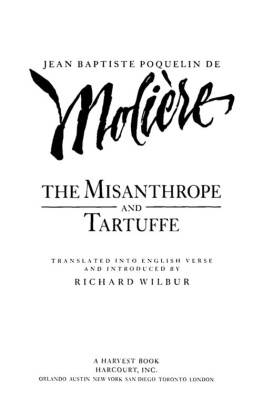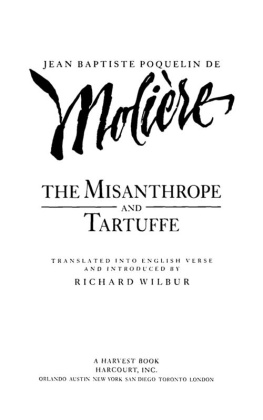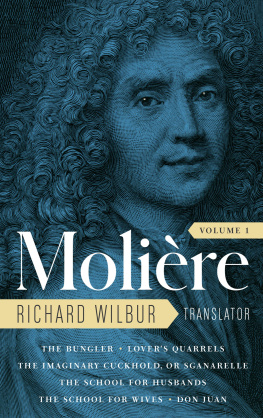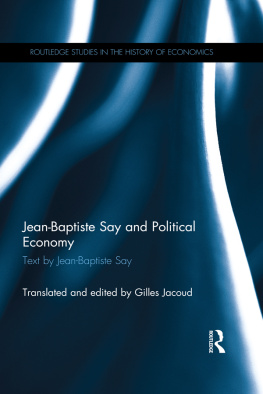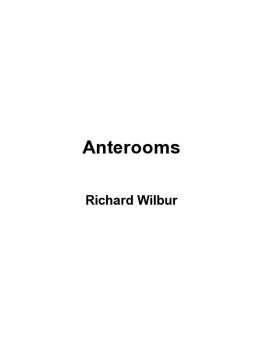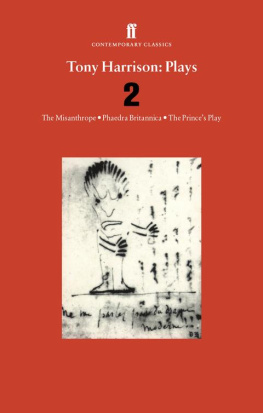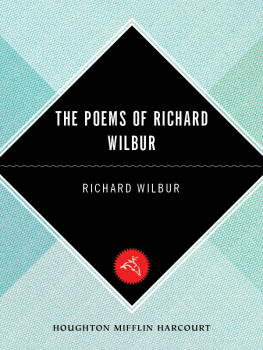Copyright 1965, 1963, 1962, 1961, 1955 by Richard Wilbur
Copyright 1954 by Richard Wilbur
Copyright renewed 1993, 1991, 1990, 1989, 1983, 1982 by Richard Wilbur
All rights reserved. No part of this publication may be reproduced or transmitted in any form or by any means, electronic or mechanical, including photocopy, recording, or any information storage and retrieval system, without permission in writing from the publisher.
Requests for permission to make copies of any part of the work should be submitted online at www.harcourt.com/contact or mailed to the following address: Permissions Department, Harcourt, Inc., 6277 Sea Harbor Drive, Orlando, Florida 32887-6777.
www.HarcourtBooks.com
CAUTION : Professionals and amateurs are hereby warned that these translations, being fully protected under the copyright laws of the United States of America, the British Empire, including the Dominion of Canada, and all other countries which are signatories to the Universal Copyright Convention and the International Copyright Union, are subject to royalty. All rights, including professional, amateur, motion picture, recitation, lecturing, public reading, radio broad-casting, and television, are strictly reserved. Particular emphasis is laid on the question of readings, permission for which must be secured from the author's agent in writing. Inquiries on professional rights (except for amateur rights) should be addressed to Mr. Gilbert Parker, William Morris Agency, 1350 Avenue of the Americas, New York, New York 10019; inquiries on translation rights should be addressed to Permissions Department, Harcourt, Inc., 6277 Sea Harbor Drive, Orlando, Florida 32887-6777.
The amateur acting rights of Tartuffe are controlled exclusively by the Dramatists Play Service, Inc., 440 Park Avenue South, New York, New York 10016. No amateur performance of the play may be given without obtaining in advance the written permission of the Dramatists Play Service, Inc., and paying the requisite fee.
Act One, Scene Two, of this translation of The Misanthrope was first published in New World Writing 5. Certain scenes of this translation of Tartuffe appeared in Poetry, Drama Critique, and the Massachusetts Review.
ISBN-13: 978-0-15-660517-5 (pbk.)
ISBN-10: 0-15-660517-1 (pbk.)
Printed in the United States of America
First Harvest edition 1965
QQ SS UU VV TT RR
A Note to the Harvest Edition
There are one or two things I should like to say to those who will be using this edition of The Misanthrope and Tartuffe as a script. These translations have had the good luck to be performed, a number of times, in New York, regional, and university theaters, and also on radio and on television. The best of the stage productions have repeatedly proved what the fact of radio production would suggest: the verbal sufficiency of Moliere's serious comedies. What the plays are about, what the characters think, feel, and do, is clearly and amply presented in the dialogue, so that a mere reading-aloud of the lines, without any effort at performance, can provide a complete, if austere, experience of the work.
I do not mean to say that there are no open questions in either play. To what extent do Philinte and Clante, in their reasonable yet ineffectual speeches, express the playwright's view of things? Is Climne incorrigibly trivial, or is she in process of developing a moral sensitivity, a capacity for love? Is it possible that Tartuffe possesses, in his real and underlying nature, a kind of balked religious yearning? And what on earth does Elmire see in Orgon? These are questions that director and actor may, and indeed must, decide; but it will be found that Moliere's comedy, because it is so thoroughly "written," resists the overextension of any thesis. The actor or director who insists on a stimulatingly freakish interpretation will find himself engaged in deliberate misreading and willful distortion, and the audience will not be deceived.
In short, trust the words. Trust the words to convey the point and persons of the comedy, and trust them also to be sufficiently entertaining. A fussy anxiety on the part of the director, whereby the dialogue is hurried, cut, or swamped in farcical action, is the commonest cause of failure in productions of Molire. To such want of confidence in the text we owe the occasional presentation of the fops, Acaste and Clitandre, as flouncingly epicene, or the transformation of Tartuffe's two interviews with Elmire into a couple of wrestling bouts. In the first case the characters are falsified for the sake of an easy laugh, and cease to be legitimate rivals to Alceste for the hand of Climne; in the second case, a real quality of Tartuffe'shis lustfulnessis manifested, but at the cost of making his great speeches seem redundant and pointlessly nuanced. The cost is too great, and once again the audience, though it may consent to laugh, will not be satisfied.
The introductions to the original editions still say what I think, and I shall let them stand. Were I to revise them, the second would explicitly and gratefully refer to the criticism of Jacques Guicharnaud, and each would contain a qualification of my claim to accuracy. The translation of The Misanthrope does not fully reproduce the formulaic preciosity with which some of the characters speak of love. In translating Tartuffe, I have not always captured Madame Pernelle's way of slipping into old-fashioned and inelegant speech, or Mariane's of parroting the rhetoric of artificial romances. My excuse for these deficiencies is that, while echoes of an unchanging scripture or liturgy are readily duplicated, as in the speeches of Tartuffe, a translation that seeks to avoid a "period" diction cannot easily find equivalents for such quirks and fads of language as I have mentioned.
R.W.
Portland, Connecticut, 1965
THE MISANTHROPE
COMEDY IN FIVE ACTS, 1666
To Harry Levin
INTRODUCTION
The idea that comedy is a ritual in which society's laughter corrects individual extravagance is particularly inapplicable to The Misanthrope. In this play, society itself is indicted, and though Alceste's criticisms are indiscriminate, they are not unjustified. It is true that falseness and intrigue are everywhere on view; the conventions enforce a routine dishonesty, justice is subverted by influence, love is overwhelmed by calculation, and these things are accepted, even by the best, as "natural." The cold vanity of Oronte, Acaste, and Clitandre, the malignant hypocrisy of Arsino, the insincerity of Climne, are to be taken as exemplary of the age, and Philinte's philosophic tolerance will not quite do in response to such a condition of things. The honest liante is the one we are most to trust, and this is partly because she sees that Alceste's intransigence A quelque chose en soy de noble & d'hroque.
But The Misanthrope is not only a critique of society; it is also a study of impurity of motive in a critic of society. If Alceste has a rage for the genuine, and he truly has, it is unfortunately compromised and exploited by his vast, unconscious egotism. He is a jealous friend (Je veux qu'on me distingue), and it is Philinte's polite effusiveness toward another which prompts his attack on promiscuous civility. He is a jealous lover, and his "frankness" about Oronte's sonnet owes something to the fact that Oronte is his rival, and that the sonnet is addressed to Climne. Like many humorless and indignant people, he is hard on everybody but himself, and does not perceive it when he fails his own ideal. In one aspect, Alceste seems a moral giant misplaced in a trivial society, having (in George Eliot's phrase) "a certain spiritual grandeur ill-matched with the meanness of opportunity"; in another aspect, he seems an unconscious fraud who magnifies the petty faults of others in order to dramatize himself in his own eyes.
Next page
